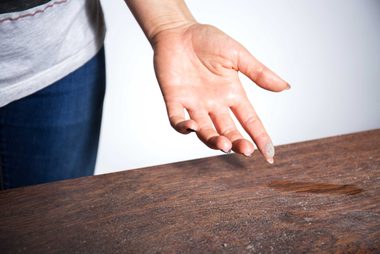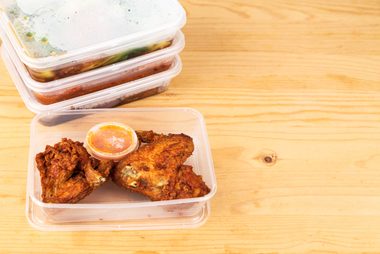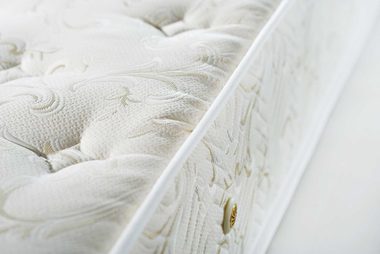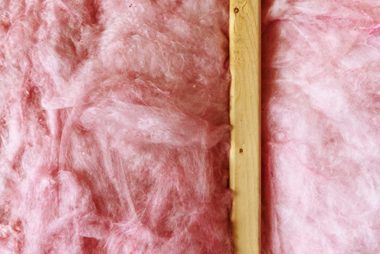
It’s dusty
If the dust is piling up in your house, you may want to check out these seven smart strategies for getting rid of dust. You’ll find added motivation thanks to new research suggesting that indoor dust found in homes in contains endocrine-disrupting chemicals that prime our body’s cells to store fat. Of the 44 house dust contaminants tested, pyraclostrobin (a pesticide), the flame-retardant TBPDP, and DBP, a commonly used plasticizer, had the strongest fat-producing effects, the study found. “Endocrine-disrupting chemicals, many of them considered obesogens, are detected in household dust and we now know very small amounts—we’re talking three micrograms—may have the power to tinker with a child’s metabolic health,” says Josh Axe, DNM, author of Eat Dirt, and co-founder of Ancient Nutrition.
What to do: “Make sure your vacuum has a high-efficiency particulate air (HEPA) filter, avoid sweeping up dry dust with a broom and consider a high-quality air filter, like one from IQAir,” Axe says. HEPA filters can remove as much as 99 percent of indoor air pollutants. Certain houseplants such as jade plants, spider plants, and Dracaena also remove pollution from your home, he says. (This is the real reason you gain weight as you age.)

Your food containers
First, make sure you’re not storing your food wrong. Then think about what you’re storing it in: If food wrapped in plastic or placed in a plastic container is microwaved, bisphenol A or BPA, for short, an estrogen-mimicking chemical that hardens plastic may leak into the food, explains Scott Kahan, MD, MPH, the director of the National Center for Weight and Wellness in Washington, DC. Several studies suggest that BPA may be linked to weight gain. One report in the International Journal of Obesity showed that women who had the highest levels of BPA in their urine gained more weight each year for 10 years than women with lower levels of BPA. While BPA is now banned in baby bottles and children’s sippy cups, it can still be found in other containers. An ongoing review from the US Food and Drug Administration supports the safety of BPA in food containers and packaging.
What to do: “Look for BPA-free products, avoid heating plastic containers as the heat allows BPA to leach into foods,” Dr. Kahan says. Other alternatives include glass, porcelain, or stainless steel containers. Uber trendy Swell water bottles are BPA free.

Vinyl flooring
“Phthalates are used for everything from making fragrances and makeup stick to your skin longer to softening rigid plastics and making them more flexible,” Axe explains. In the home, phthalates can be found in vinyl flooring, shower curtains and other vinyl products. “These chemicals could predispose people to weight gain and weight-loss resistance, possibly decades after the exposure.”
What to do: “When it’s time to choose flooring, shy away from vinyl,” he says. Better options include cork, real linoleum, or Forest Stewardship Council US (FSC-US)-certified hardwood manufactured without formaldehyde.” Opt for a natural fiber shower curtain instead of a vinyl one. “Hemp is naturally mold and mildew-resistant,” he says. (These sneaky things cause you to gain weight and they don’t have anything to do with your diet or exercise habits.)

Nonstick cookware and kitchenware
Yes, the non-stick factor makes cleaning up after dinner easier, but non-stick products contain perfluorooctanoic acid (PFOA) “Aside from being possibly carcinogenic to humans, PFOA is also known to alter thyroid hormone levels, which can contribute to weight gain,” Axe says.
What to do: Replace. Scrap your non-stick cookware for high-quality stainless steel or cast iron pots and pans.

The water spigot
Depending on your zip code and whether you drink tap water sans filtering, you may be getting a dose of PFOAs with your H2O, the Environmental Working Group (EWG) reports. The watchdog group found 250-plus industrial and agricultural contaminants present in tap water including PFOAs. Most of the nation’s drinking water supplies does pass federal and state regulatory agency testing under the Safe Drinking Water Act.
What to do: Check out how your tap water stands up here. If you don’t like what you see, EWG’s Water Filter Guide can help. (These nighttime habits can make you gain weight.)

Your mattress
You may already be thinking it’s time for a new mattress—here’s how to know for sure. And then there are the chemical reasons: “PBDEs or polybrominated diphenyl ethers are flame retardant chemicals used in consumer electronic plastics, furniture foam and mattresses,” Axe says. “Although banned today, they are persistent chemicals that don’t readily degrade and are often detected in household dust.”
What to do: “Dozens of furniture makers are now offering flame retardant-free products,” Axe says. “Look on the Thermal Insulation Technical Bulletin 117-2013 tag and make sure the ‘Contains no added flame retardant chemicals’ section is checked.” When in doubt, call the manufacturer and ask if the product contains any flame retardant chemicals. If it’s time for new mattress, consider an organic one. “They are often more expensive up front but tend to last longer.”

The basement
“Many people have fiberglass insulation in the ceilings of their basements which is also where they keep their laundry machines,” says Jeffrey C. May, MA, the principal scientist at May Indoor Air Investigations in Tyngsborough, MA, and the author of many books including The Mold Survival Guide: For Your Home and for Your Health. Fiberglass insulation is often yellow or pink and fluffy. “More than half of all houses show signs of mold growth on exposed insulation in the basement,” he says. The mold grows in dust trapped in the fiberglass. If you find yourself thinking ‘why am I gaining weight?’ it’s because mold allergy can leave you feeling lethargic, and less likely to engage in physical activity and do other things that will help maintain a normal weight, he says.
What to do: Test it. “Home Depot sells tests that can determine whether you have a toxic mold problem,” he says.

Comfort food
Mac and cheese tops our list of favorite comfort foods, but there’s evidence it contains some of the chemicals that make us fat. Research out of the Flemish Institute for Technological Research found that these powdered fake cheese dinners may have two to four times more phthalates than natural cheese—including some that are labeled as “organic.” Some research suggests that phthalates predispose us to weight gain, although the evidence is far from conclusive, Dr. Kahan says. (Surprisingly, exercising too much can make you gain weight – here’s why.)
What to do: Try making your own macaroni and cheese from scratch.

The dining room decor
The color and design of your dining room can help you lose weight, making it easier to control your eating. On the other hand, bright lights and loud music seem to encourage us to eat with abandon, according to research out of Cornell University’s Food and Brand Laboratory, in Ithaca, NY.
What to do: Dim the lights and turn down the tunes. The study found that we consume 18 percent fewer calories—775 calories versus 949—when we follow this advice, and the results suggest we enjoy our meals more!

Personal care products
You might be shocked by the toxic ingredients in personal care products. Many perfumes, lotions, and cosmetics contain phthalates, and research out of the Children’s Environmental Health Center at the Mount Sinai School of Medicine in New York City found that children who had higher levels of phthalates in their urine had higher body mass indexes (BMI) than their counterparts with lower detectable phthalate levels. Specifically, BMIs in overweight girls with the highest exposure to the phthalate included monoethyl phthalate (MEP) were 10 percent higher than those with the lowest MEP exposure.
What to do: The study does not prove that phthalates are causing weight gain, but it’s easy to choose personal care products that are phthalate-free if you are gaining weight and don’t know why.
